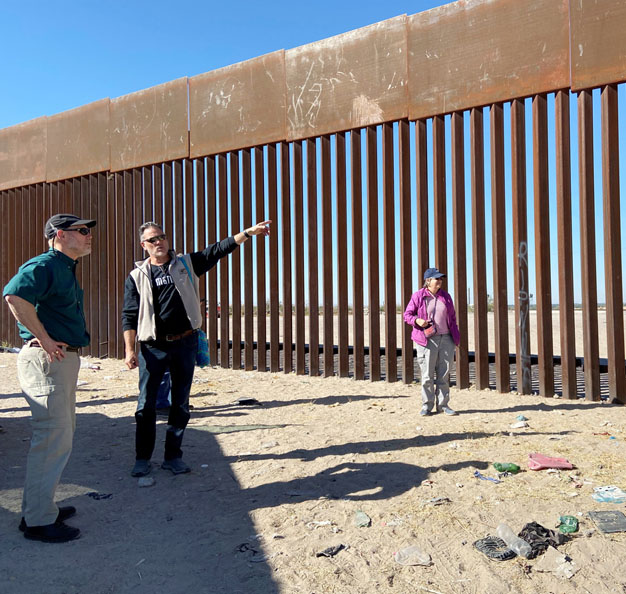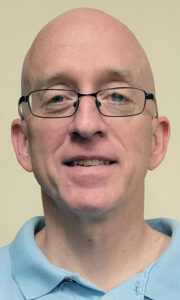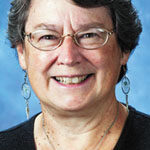
Then-Bishop Thomas Zinkula, left, listens as Marist Brother Todd shares details about the border fence that separates Ciudad Juarez, Mexico, from El Paso, Texas. They were standing on the Mexican side of the border Nov. 5, 2021. At right is then-deacon candidate Kent Ferris.
By Barb Arland-Fye
The Catholic Messenger
Texas Attorney General Ken Paxton’s decision to sue a Catholic nonprofit in El Paso that assists migrants at the border prompted concern nationwide, including in Iowa. The Iowa Legislature is considering several immigration bills that the Iowa Catholic Conference opposes as punitive or duplicative of federal law and that the Iowa City Catholic Worker community fears could adversely affect its work with migrants.
“Paxton’s office accused Annunciation House … ‘of facilitating illegal entry to the United States’ and ‘human smuggling,’ filing a lawsuit in an attempt to shut it down,” OSV news service reported Feb. 23. “Ruben Garcia, director of Annunciation House, told reporters at a Feb. 23 press conference that the nonprofit has been providing basic resources like food, shelter and water to migrants and refugees who arrive at the border for nearly 50 years in consultation with the U.S. Border Patrol.”

Deacon Kent Ferris, the Diocese of Davenport’s director of Social Action and Catholic Charities, was among five then-deacon candidates who traveled to El Paso and Ciudad Juarez, Mexico in November 2021 with their bishop at the time, Thomas Zinkula. Their goal was to learn more about the situation at the border — to encounter, to listen, to walk with the people there.
“As a global Church, the compassion we are to express knows no borders,” Deacon Ferris said. His deacon candidate group met with people in El Paso-Ciudad Juarez, including Bishop Jose Guadalupe Torres Campos in Ciudad Juarez and Bishop Mark Seitz in El Paso. They “spoke with great concern about the enormous humanitarian need of immigrants who had come to their dioceses. They described the services and care provided from their dioceses and parishes as well as the services provided by other Catholic entities.”
Both bishops “have met immigrants, know them by name, heard their story. It is that same openness to encounter that has compelled people in our diocese to welcome folks from Ukraine and Afghanistan, from Cameroon and Sudan, from Venezuela and Guatemala, and not just some time in the past, but presently. People here in the diocese are helping newcomers with housing, food, clothing, school enrollment, employment. The people here are praying and celebrating with newcomers, praying and crying for family members still on their perilous journey hoping to be reunited.”
“Bishop Seitz knows the years of service that Annunciation House has provided, knows they are part of the safety net in their diocese,” Deacon Ferris said. “How would the modern-day version of the story of the Good Samaritan read if the innkeeper had been shut down because a government official demanded to know all who had been served?”
Expressing solidarity
In his Feb. 23 statement, Bishop Seitz described Annunciation House as “an effective, compassionate local response to a complex and broken immigration system. Rooted in the Gospel, and born of an encounter between Ruben Garcia and Mother Teresa of Kolkata, it has led our community effort to meet the challenge of migration in recent years. Its work is nourished by long-standing partnerships with the Catholic Church in El Paso, our local government and our federal law enforcement partners, including U.S. Border Patrol. Its work is an example of our Catholic commitment to the poor, the Christian call to love one’s neighbor, and stepping into the breach to take action where many will not. Our church, our city and our country owe Annunciation House a deep debt of gratitude.”
The Texas Catholic Conference of Bishops and the U.S. Conference of Catholic Bishops issued statements in solidarity with Bishop Seitz and the ministries provided by faith-based organizations. “I join my brother bishops in the State of Texas in expressing solidarity with those seeking simply to fulfill the fundamental biblical call: ‘whatever you did for one of these least brothers of mine, you did for me,’” said Bishop Kevin Rhoades. He chairs the USCCB’s Committee for Religious Liberty.
Like Annunciation House, the Iowa City Catholic Worker House community “also works closely with a number of immigration attorneys in Iowa,” the community stated in an email to supporters. “We regularly connect newly arrived asylum-seekers and unaccompanied minors with consultations and small-dollar loans to start their immigration cases and pay for their work visas. Thanks to our collaborative work, in the last two years, nearly two dozen immigrant children in the country without a parent have won permanent residency through a special juvenile visa program.” The community fears its work could end under the proposed legislation.
The Iowa Catholic Conference (ICC), the public policy voice of Iowa’s bishops, states “Catholic social teaching recognizes a country’s right and responsibility to manage its borders in accordance with the common good. At the same time, serving newcomers is compelled by Sacred Scripture and Catholic social teaching and is a core ministry of the Church.”
“…The bishops support border protection policies that are consistent with humanitarian values and with the need to treat all individuals with respect, while allowing the authorities to carry out the critical task of identifying and preventing entry of terrorists and dangerous criminals. Unfortunately, there are several bills moving in the Iowa Legislature which do not align with these principles,” the ICC states in an action alert on its website (votervoice.net/ICC/ campaigns/112022/respond). The ICC encourages Iowans to contact their Iowa legislators regarding the following bills:
- HF 2567 and SF 2340 would create a state crime of “illegal entry into the state by an alien.” The ICC believes federal law and the U.S. Constitution pre-empt these bills. “It is problematic that these bills would explicitly allow state officials to prosecute an individual for state immigration crimes, even if that person’s application for immigration relief is pending before federal authorities.”
- HF 2608 would create the state crime of “smuggling of persons.” The bill’s language is vague, the ICC believes. “Does ‘encourage’ or ‘induce’ a person to remain in the U.S. mean providing food or shelter to an immigrant? Does it mean a person sending money home to a family? That should not be out of bounds. An amendment has improved the bill somewhat,” said Tom Chapman, the ICC’s executive director.
- HF 2320 would forbid state universities and community colleges from offering in-state tuition to Iowa residents unless they can prove “lawful presence.” Young people “should not be hindered from working towards a promising future only because they were brought to the United States by their parents at a young age without legal status.”
- SF 108 would require usage of the voluntary federal “e-verify” program mandatory for employers in Iowa. E-verify, a web-based system, allows enrolled employers to confirm the eligibility of their employees to work in the U.S. “This bill is duplicative in part because the federal government is already authorized to investigate employment violations in this context.”
“The Church is asking for policies that are merciful,” the ICC states. “Please take the time to send a message in your own words to your State Senator and Representative in opposition to these bills.”











